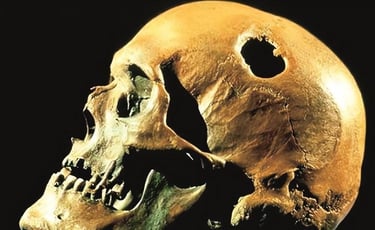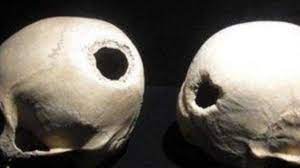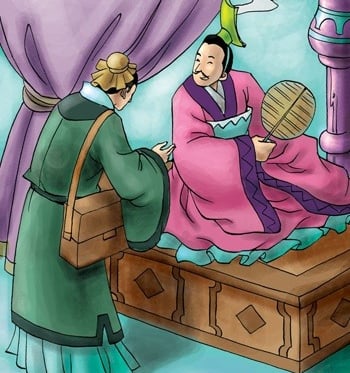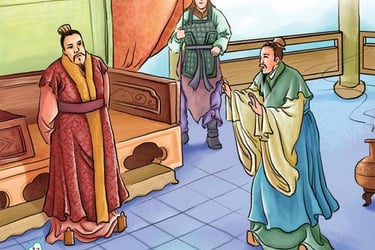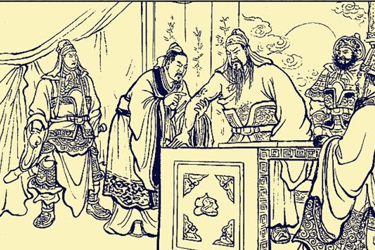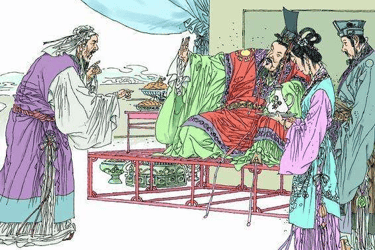History of Traditional Chinese Medicine
In ancient China, there were no medical radio scanners to locate the position of brain tumors. However, how did surgeons operate on brain conditions?
Dr Zhu Weimin (June 23, 2023)
Do you see skulls operated on 5,000 years ago, at a time when there were no X-rays or scanners? How could surgeons precisely locate the focus of the disease and remove the exact piece of bone they needed to extract? Look at these two real stories, perhaps you can understand this question.
Story of Dr. Bian Que (Approximately 407-310 BC)
"The Book of Documents 'Shi Ji,' in the chapter dedicated to Bian Que, states:
When Bian Que arrived in Qi, he was received as a guest by Marquis Huan of Qi. During their meeting, he said, 'Your Lordship is suffering from a disease in the skin pores, if left untreated, it will worsen.' Marquis Huan replied, 'I am not sick.' Bian Que left, and Marquis Huan said to his entourage, 'This doctor is too greedy for profits, he wants to be recognized as a healer even when I am not sick.' Five days later, Bian Que returned and said, 'Your Lordship is suffering from a disease in the blood vessels, if left untreated, it may worsen.' Marquis Huan replied, 'I am not sick.' Bian Que left, and Marquis Huan was annoyed. Five days later, Bian Que returned and said, 'Your Lordship is suffering from a disease between the intestines and stomach, if left untreated, it will worsen.' Marquis Huan did not respond. Bian Que left, and Marquis Huan was displeased. Five days later, Bian Que returned, looked at Marquis Huan, and fled. Marquis Huan sent someone to ask why. Bian Que replied, 'When the disease is in the skin pores, it is the domain of hot vapor; when it is in the blood vessels, it is the domain of needles and stones; when it is in the intestines and stomach, it is the domain of wines and broths; but when it is in the marrow of the bones, even heavenly physicians can do nothing about it. Now that it is in the marrow of the bones, I have nothing more to offer.' Five days later, Marquis Huan fell ill and sent someone to find Bian Que, but Bian Que had already fled. Marquis Huan eventually died."
Story of Hua Tuo (145-208 AD)
Hua Tuo was already extremely skilled in medicine when he was young. He had a habit of treating the poor, and if they truly couldn't afford the consultation fees, he would exempt them from payment. Sometimes, he even provided them with medicine. His local reputation spread throughout the region.
One day, Hua Tuo was diagnosing a patient in an inn. Since the patient was completely destitute, Hua Tuo decided to waive all fees and even provided the necessary remedies. It so happened that a Taoist named Li was also staying at this inn and carefully observed every move of Hua Tuo. The Taoist Li greatly admired Hua Tuo's medical integrity and invited him to his room. Li asked Hua Tuo, "I've heard that you are very skilled in medicine. Could you take a look at my condition?" Hua Tuo replied, "Of course."
The Taoist Li said, "I am a Taoist without money." Hua Tuo said, "If you have no money, I will see you for free." So, Hua Tuo took the pulse of the Taoist Li, but he couldn't detect the problem with the illness. Hua Tuo shook his head. The Taoist Li asked, "Besides taking the pulse, what other methods do you use?" Hua Tuo replied that he could also use observation, smell, and interrogation. The Taoist Li said, "Those are all common diagnostic methods, but the most powerful method is celestial vision."
En entendant cela, Hua Tuo fut très impatient et dit : "J'ai déjà entendu parler de la vision céleste de mon maître, mais je ne sais pas comment y parvenir. Pourriez-vous me donner des conseils, s'il vous plaît ?" Li le taoïste répondit : "J'ai une ordonnace qui, une fois ingérée, peut ouvrir la vision céleste. Le catalyseur de la formule nécessite de "l'eau sans racines." Hua To demanda ce qu'était l'eau sans racines, et Li le taoïste dit : "C'est l'eau de pluie qui ne touche pas le sol." Hua Tuo dit : "Il suffit de recueillir l'eau de pluie dans un récipient, mais s'il ne pleut pas aujourd'hui, que pouvons-nous faire ?" Li le taoïste dit : "Je ne parle pas de ce genre d'eau, il en existe une autre." Li le taoïste conduisit Hua Tuo dans la cour, où il fendit une barrière en bambou avec un couteau, laissant ainsi couler un peu d'eau qui était restée là depuis la pluie de la veille. Li le taoïste demanda à Hua Tuo de boire cette "eau sans racines" tout en prenant le médicament. Depuis lors, la vision céleste de Hua Tuo fut ouverte.
Li le taoïste transmettait également à Hua Tuo quelques ordonnaces secrètes, ce qui contribua à accroître sa renommée. Plus tard, Hua Tuo diagnostiqua une céphalée de Cao Cao (le roi du royaume de Wei pendant la période des Trois Royaumes). Après une séance d'acupuncture, la douleur se dissipa temporairement. Cependant, Hua Tuo informa Cao Cao qu'il devait subir une intervention chirurgicale pour retirer quelque chose de sa tête. Cao Cao, méfiant et craignant que Hua Tuo ne profite de l'opération pour le tuer, refusa l'intervention et demanda à Hua Tuo de rester à ses côtés pour des traitements d'acupuncture à long terme. Mais Hua Tuo avait à l'esprit les nombreux patients ordinaires et ne voulait pas se consacrer uniquement à un seul patient. Il prétexta que sa femme était malade et rentra chez lui. Cao Cao envoya des gens enquêter et découvrit que Hua Tuo l'avait trompé. Il fit arrêter et tuer Hua Tuo. Ainsi, l'ordonnace de l'anesthésique chirurgical, le "Ma Fei San", élaborée par Hua Tuo pendant de nombreuses années, fut perdue à jamais.
You might also be interested in the article below :
